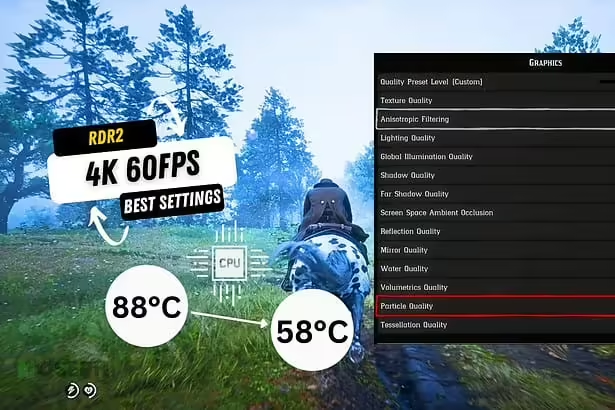Game development has grown significantly since the early days of arcade games, personal computers, and home consoles in the 1970s. These early innovations laid the groundwork for the advanced tools and technologies we use today.
However, the origins of video games go back even further. In 1962, Steve Russell and his team at MIT created Spacewar! on a PDP-1 minicomputer, marking an important moment that eventually led to the thriving industry we see today.
Reflecting on this journey, I am continually amazed by the advancements in game development. Each new game offers a unique experience, evolving in ways that would have been unimaginable just a few decades ago. Think back to the early days of God of War when its intensity was unforgettable. Now, compare that to God of War: Ragnarök from 2022, where the storytelling, gameplay mechanics, and graphics have reached extraordinary levels.
The same sense of wonder applies to Red Dead Redemption 2. The depth and realism that Rockstar achieved still impress me. These advancements are made possible by the powerful game development frameworks that now serve as the foundation of modern gaming.
How Game Development Works
Creating a video game is a complex process that involves several stages, from the initial concept to the final release. At its core, game development blends creativity with technology. Here’s a straightforward overview of what it typically involves:
- Concept and Design: Everything starts with an idea. Developers and designers collaborate to create the game’s concept, characters, and story. This phase also includes planning the gameplay mechanics, level design, and the overall player experience.
- Development: This is where the coding takes place. Developers use programming languages and frameworks to bring the game to life. This stage involves building the game’s engine, creating assets like graphics and sound, and implementing gameplay features.
- Testing: Before the game is released, it goes through rigorous testing to find and fix bugs. This ensures that the game runs smoothly and provides a good experience for players.
- Launch and Updates: After testing, the game is released to the public. Developers often release updates post-launch to fix any issues and add new content.
As we progress through 2024, it’s clear that game development continues to break new ground. Unreal Engine 5 stands at the forefront of this evolution, enabling developers to create immersive and visually stunning experiences. Black Myth: Wukong is one of the most talked-about games this year, showcasing the remarkable capabilities of Unreal Engine 5 and setting new benchmarks for visual storytelling and gameplay.
In this article, we’ll take a look at the top 14 game development frameworks that are making a real impact this year. Each one brings something unique to the table, whether you’re a seasoned developer or just starting your journey in game creation.
Comparison Table: Best Game Development Frameworks in 2024
| Framework | Type | Focus Area | Ideal For | Recent Updates (Year) | Platforms |
|---|---|---|---|---|---|
| Unreal Engine | Commercial | High-end AAA games | Large studios, complex 3D projects | 2024 | PC, Console, Mobile |
| Unity | Commercial | Cross-platform, 2D/3D | Indie developers, mobile games, VR/AR | 2024 | Mobile, PC, Console |
| Godot Engine | Open Source | Indie games, 2D/3D | Small to medium projects | 2024 | Mobile, PC, Web |
| RPG Maker | Commercial | Role-playing games (RPGs) | Beginners, storytellers | 2024 | PC, Mobile |
| Cocos2d-x | Open Source | 2D games | Mobile developers, cross-platform | 2024 | Mobile, PC |
| CryEngine | Commercial | High-fidelity visuals | AAA studios, high-end projects | 2024 | PC, Console |
| RAGE (Rockstar Advanced Game Engine) | Proprietary | Open-world games | Rockstar Games projects | 2024 | PC, Console |
| GameMaker Studio 2 | Commercial | 2D game development | Indie developers, beginners | 2024 | PC, Mobile, Web, Console |
| Phaser | Open Source | Web-based 2D games | Web developers | 2024 | Web |
| Solar2D | Open Source | 2D mobile games | Mobile game developers | 2024 | Mobile |
| GDevelop | Open Source | No-code 2D games | Beginners, educational projects | 2024 | Mobile, PC, Web |
| Torque3D | Open Source | 3D game development | Indie developers, open-source projects | 2024 | PC, Web |
| Stencyl | Commercial | Drag-and-drop 2D games | Beginners, mobile developers | 2024 | Web, Mobile |
| HaxeFlixel | Open Source | Pixel art, retro games | Indie developers | 2024 | Desktop, Mobile |
1. Unreal Engine
Unreal Engine has established itself as one of the most respected game development frameworks in 2024. Known for delivering high-quality visuals and providing powerful tools, Unreal Engine enables developers to create immersive and engaging game experiences. It has become a cornerstone in the gaming industry, helping to develop some of the most iconic games of recent years.

One of the most striking showcases of Unreal Engine’s capabilities is Black Myth: Wukong, which has captivated the gaming community with its breathtaking visuals and fluid gameplay. The developers at Game Science have harnessed features like Nanite Virtualized Geometry to create intricate environments that perform seamlessly across platforms. Lumen’s dynamic lighting further enhances the atmosphere, making it one of the most anticipated games of the year.
But Black Myth: Wukong is just the beginning. Unreal Engine has also been instrumental in the development of many other AAA titles, each pushing the limits of what’s possible in game design. These projects demonstrate the engine’s versatility and its significant role in advancing the gaming industry.
Top AAA Games Powered by Unreal Engine
| Game Title | Developer | Year Released | Unreal Engine Usage |
|---|---|---|---|
| Black Myth: Wukong | Game Science | 2024 | Advanced graphics and smooth gameplay using UE5 |
| Fortnite | Epic Games | 2017 | Cross-platform battle royale with advanced graphics engine |
| Final Fantasy VII Remake | Square Enix | 2020 | Reimagined RPG with real-time combat and high-fidelity visuals |
| Gears of War Series | Epic Games, The Coalition | 2006 – Present | Third-person shooter utilizing powerful physics and AI |
| The Matrix Awakens | Epic Games | 2021 | Tech demo showcasing real-time graphics and physics |
| Unreal Tournament | Epic Games | 1999 | Multiplayer FPS with advanced graphics and multiplayer infrastructure |
| Borderlands 3 | Gearbox Software | 2019 | Looter-shooter with a vibrant art style powered by Unreal |
| Street Fighter V | Capcom | 2016 | Fighting game enhanced with advanced character animation tools |
| BioShock Infinite | Irrational Games | 2013 | First-person shooter with narrative-driven gameplay |
| Batman: Arkham City | Rocksteady Studios | 2011 | Open-world action game with dynamic combat systems |
Unreal Engine Features:
- Nanite Virtualized Geometry: Enables the creation of highly detailed environments by dynamically adjusting the level of detail based on hardware capabilities, ensuring smooth performance across various systems.
- Lumen Global Illumination: Provides real-time dynamic lighting and reflections, significantly enhancing the visual realism of game worlds.
- Advanced Animation Tools: Includes a robust Skeletal Editor and Motion Matching, allowing for more fluid and natural character animations, which streamline the development process.
- Procedural Content Generation: Allows game developers to create unique, dynamic environments that can be generated in real-time, offering endless possibilities for creative world design.
- Cross-Platform Support: Supports development for PC, consoles, mobile devices, and VR, making it highly versatile for various types of game development projects.
Pros:
- Exceptional Graphics Quality: Renowned for producing some of the most visually stunning games in the industry, with features that support detailed textures, realistic lighting, and dynamic environments.
- Comprehensive Platform: Provides game developers with a wide range of features, from advanced physics simulations to complex animation systems, enabling the creation of polished, high-quality games.
- Strong Community and Support: With a large community of game developers and extensive documentation, Unreal Engine users can easily find the resources and support they need to overcome challenges and improve their skills.
- Versatile and Scalable: Suitable for a wide range of game development projects, from simple mobile games to complex AAA titles, making it a highly flexible platform.
Cons:
- Steep Learning Curve: The platform’s extensive features and capabilities can be challenging for newcomers, requiring a significant investment of time and effort to master.
- Hardware Demands: Unreal Engine’s advanced features require powerful hardware, which can be a limitation for smaller teams or developers with limited resources.
- Complexity: While the depth of Unreal Engine’s features is a strength, it can also be overwhelming for smaller projects or teams, potentially slowing down development.
Unreal Engine remains a top choice for game developers who want to create visually impressive and technically advanced games. Its robust features and flexibility make it suitable for both large studios and independent developers with big ambitions.
Although mastering the platform may require time, the results it can deliver are well worth the effort. For those committed to producing high-quality games, Unreal Engine offers the necessary tools to turn creative ideas into reality, from high-budget AAA games to unique indie projects.
2. Unity
Unity has solidified its position as a leading game development framework in 2024, thanks to its continuous evolution and the extensive range of features it offers to developers. It is widely recognized for its flexibility, making it suitable for both simple mobile games and complex 3D projects on consoles and VR platforms. Unity is favored not just for its technical capabilities but also for its user-friendly interface and the active community that supports it.

This year, Unity introduced several updates that have enhanced its capabilities, particularly in graphics and performance. The release of Unity 2023.3 Tech Stream, now known as Unity 6 Preview, has brought significant advancements in rendering efficiency, including improved GPU management and optimized object rendering. These updates ensure that developers can create high-quality, visually impressive games across various platforms, keeping Unity at the forefront of game development technology.
Some of the latest AAA games developed with Unity, such as Genshin Impact, Escape from Tarkov, and Ori and the Blind Forest, clearly illustrate the engine’s capacity to produce visually stunning and technically advanced games. These titles not only achieved commercial success but also set new benchmarks in the industry, reaffirming Unity’s position as a leading framework for game development in 2024.
Top AAA Games Powered by Unity
| Game Title | Developer | Year Released | Unity Framework Usage |
|---|---|---|---|
| Assassin’s Creed Identity | Ubisoft | 2016 | Mobile adaptation with Unity’s 3D tools |
| Hearthstone | Blizzard Entertainment | 2014 | Cross-platform development with Unity |
| Monument Valley | ustwo games | 2014 | Artistic 3D puzzle design using Unity |
| Rust | Facepunch Studios | 2013 | Multiplayer survival with Unity’s physics engine |
| Shadowrun Returns | Harebrained Schemes | 2013 | Isometric RPG built with Unity’s 2D and 3D tools |
| Ori and the Blind Forest | Moon Studios | 2015 | 2D platformer with Unity’s rich visual effects |
| Hollow Knight | Team Cherry | 2017 | Metroidvania game created using Unity |
| Subnautica | Unknown Worlds Entertainment | 2018 | Open-world underwater exploration with Unity |
| Genshin Impact | miHoYo | 2020 | Open-world RPG leveraging Unity’s cross-platform support |
| Escape from Tarkov | Battlestate Games | 2017 | Realistic shooter using Unity’s detailed environment rendering |
Unity Features:
- Cross-Platform Development: Unity allows developers to build games for various platforms, from mobile devices to high-end consoles and virtual reality systems.
- Extensive Asset Store: Unity’s asset store offers a wide selection of pre-made assets, scripts, and tools, enabling developers to save time and focus on other aspects of game creation.
- User-Friendly Interface: Designed to be accessible, Unity makes it easier for both new and experienced developers to create games efficiently.
- Improved Graphics and Performance: Recent updates bring enhancements in 3D rendering and performance, ensuring that games developed with Unity are visually impressive and run smoothly.
- Strong Community Support: Unity’s large, active community provides valuable resources, including tutorials and forums, to help developers solve problems and learn new techniques.
Pros:
- Flexibility: Unity supports a wide range of game types and platforms, making it a versatile engine for developers with different needs.
- Ease of Use: The intuitive interface and comprehensive documentation make Unity accessible to developers of all skill levels.
- Rich Asset Store: The asset store provides a variety of pre-made content, which can significantly speed up the development process.
- Continuous Updates: Regular updates ensure that Unity remains at the cutting edge of game development technology.
Cons:
- Performance Issues on Lower-End Devices: Games developed with Unity can sometimes face performance challenges, especially on less powerful hardware.
- Licensing Costs: While Unity offers a free version, larger studios or those generating significant revenue may need to invest in a paid license.
- Complexity in Large Projects: Managing and optimizing large-scale projects in Unity can be challenging, particularly when dealing with many assets or complex gameplay mechanics.
Unity continues to be an excellent choice for game developers in 2024. Its powerful features and flexibility make it ideal for a wide range of projects, from indie games to large-scale, cross-platform titles. With its ongoing updates and strong community support, Unity remains a reliable engine that helps developers bring their creative visions to life.
3. Godot Engine
Godot Engine has steadily gained traction, particularly within the indie game development community, due to its open-source nature and extensive feature set. In 2024, Godot continues to be a strong contender in the game development space, with the release of Godot 4.3 introducing several key improvements that enhance both 2D and 3D development capabilities.
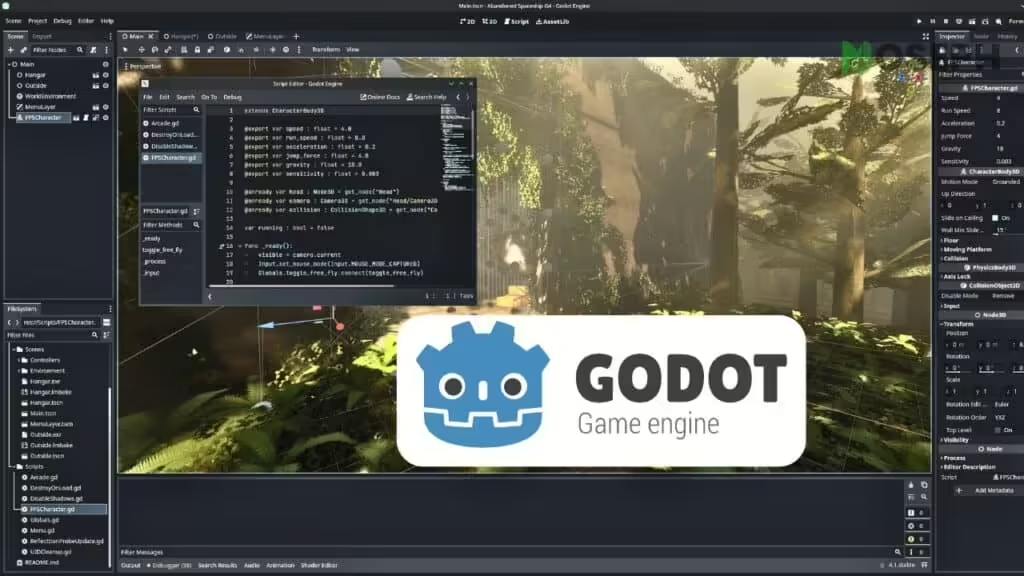
This year, Godot is increasingly being recognized not just as a tool for smaller projects, but as a robust engine capable of powering more ambitious games.
Godot Engine Features:
- Open-Source and Free: Godot is fully open-source under the MIT license, meaning there are no licensing fees, making it accessible to developers at all levels.
- Modular Scene System: Godot’s scene system allows developers to organize their projects efficiently by creating reusable components, making it easier to manage complex games.
- Multi-Language Support: Godot supports several scripting languages, including its own GDScript, C#, and community-driven integrations with Rust and other languages. This flexibility caters to a wide range of developer preferences.
- Enhanced 2D and 3D Tools: The latest updates in Godot 4.3 bring significant enhancements, including a new visual shader editor, improved pixel art stability, and premultiplied alpha blending for better visual effects in 3D environments. The engine also introduced a depth-based fog system, which is particularly useful for creating atmospheric effects in games.
- Cross-Platform Export: Godot enables seamless deployment across multiple platforms, including desktop, mobile, and web, allowing developers to reach a broader audience with minimal adjustments.
Top AAA Games Powered by Godot Engine
Although Godot is often associated with indie titles, it has also been used to develop some notable games that have garnered attention:
| Game Title | Developer | Year Released | Godot Framework Usage |
|---|---|---|---|
| Hollow Knight: Silksong | Team Cherry | Upcoming | Developed using Godot’s advanced 2D and 3D tools |
| Ex-Zodiac | Ben Hickling | 2022 | Stylized 3D graphics with Godot’s scene system |
| The Interactive Adventures of Dog Mendonça & Pizzaboy | OKAM Studio | 2016 | 2D adventure game leveraging Godot’s scripting tools |
| Sealed Bite | Rovio Entertainment | 2019 | Action game built using Godot’s 2D engine |
| Deponia Doomsday | Daedalic Entertainment | 2016 | Point-and-click adventure game using Godot’s narrative tools |
Pros:
- Cost-Free Access: Godot provides professional-grade tools without any associated costs, making it an ideal choice for developers of all budgets.
- Community Support: With a large and active community, Godot benefits from continuous improvements and a wealth of resources for learning and troubleshooting.
- Ease of Use: Godot’s user-friendly interface and modular scene system make it accessible to both beginners and experienced developers.
Cons:
- Less Common in AAA Development: While powerful, Godot is less frequently used for large AAA titles, which might limit its appeal for developers working on high-budget projects.
- Smaller Asset Library: Compared to engines like Unity, Godot’s asset library is smaller, potentially requiring developers to create more custom assets.
Godot continues to rise in popularity, especially among indie developers, thanks to its flexible, open-source framework and powerful toolset. The recent updates in Godot 4.3 have further solidified its capabilities, making it a compelling option for a wide range of game development projects.
4. RPG Maker
RPG Maker has long been a staple in the game development community, particularly for those interested in creating role-playing games (RPGs). Over the years, RPG Maker has evolved, adding more advanced tools and features while maintaining its accessibility.

In 2024, RPG Maker remains a popular choice for developers focused on storytelling and character-driven experiences, making it an ideal platform for both beginners and seasoned creators.
RPG Maker Features:
- Specialized for RPG Development: RPG Maker is designed specifically for creating RPGs, offering the necessary tools to build characters, maps, and storylines without requiring in-depth programming knowledge.
- User-Friendly Interface: The engine’s drag-and-drop functionality and event-based scripting make it accessible to users of all skill levels, allowing them to focus on storytelling and game mechanics rather than technical details.
- New Asset Sharing Feature: RPG Maker WITH introduces an innovative asset-sharing feature that allows developers to collaborate by sharing maps, events, and other assets, making it easier to build games together.
- Extensive Asset Library: The engine includes a vast array of pre-made assets, from character sprites to music, which can be easily customized to fit the developer’s vision.
- Cross-Platform Export: RPG Maker allows games to be exported to various platforms, including PC, consoles, and mobile devices, ensuring that games reach a wide audience.
Top Games Developed with RPG Maker
RPG Maker has been instrumental in the creation of several acclaimed indie RPGs, some of which have gained significant recognition:
| Game Title | Developer | Year Released | RPG Maker Framework Usage |
|---|---|---|---|
| To the Moon | Freebird Games | 2011 | Story-driven RPG using RPG Maker’s event scripting and asset customization |
| OneShot | Little Cat Feet | 2016 | Innovative RPG with meta-narrative, developed using RPG Maker |
| LISA: The Painful | Dingaling Productions | 2014 | Post-apocalyptic RPG with unique mechanics and storytelling, built in RPG Maker |
| Mad Father | Sen | 2012 | Horror RPG that leverages RPG Maker’s event system and asset customization |
| Omori | OMOCAT | 2020 | Psychological horror RPG developed using RPG Maker’s flexible tools |
Pros:
- Tailored for RPGs: RPG Maker is highly specialized for the RPG genre, offering tools and features specifically designed for creating story-rich games.
- Ease of Use: The engine’s drag-and-drop interface and event-based scripting make it accessible to beginners, allowing them to create complex games without extensive programming knowledge.
- Rich Asset Library: The pre-made assets included with RPG Maker save time and provide a solid foundation for game development, particularly for those new to game creation.
Cons:
- Limited to RPGs: While powerful for its intended purpose, RPG Maker is less versatile when it comes to creating games outside the RPG genre, which may limit its appeal for developers looking to explore other game types.
- Performance Limitations: RPG Maker games can sometimes suffer from performance issues, especially with large projects or when running on lower-end devices.
- Less Flexibility in Advanced Customization: While RPG Maker is excellent for beginners, more experienced developers may find it limiting when trying to implement highly customized mechanics or graphical effects.
RPG Maker continues to stand out in 2024 as a preferred tool for creating RPGs, thanks to the introduction of RPG Maker WITH, which has enhanced collaborative game development. This makes it an excellent choice for both solo developers and teams looking to create rich, narrative-driven experiences.
5. Cocos2d-x
Cocos2d-x continues to be a standout choice for game developers in 2024, particularly for those focused on creating high-performance 2D games. This open-source game development framework, written in C++, is known for its lightweight and fast-running capabilities, making it ideal for mobile and cross-platform game development.
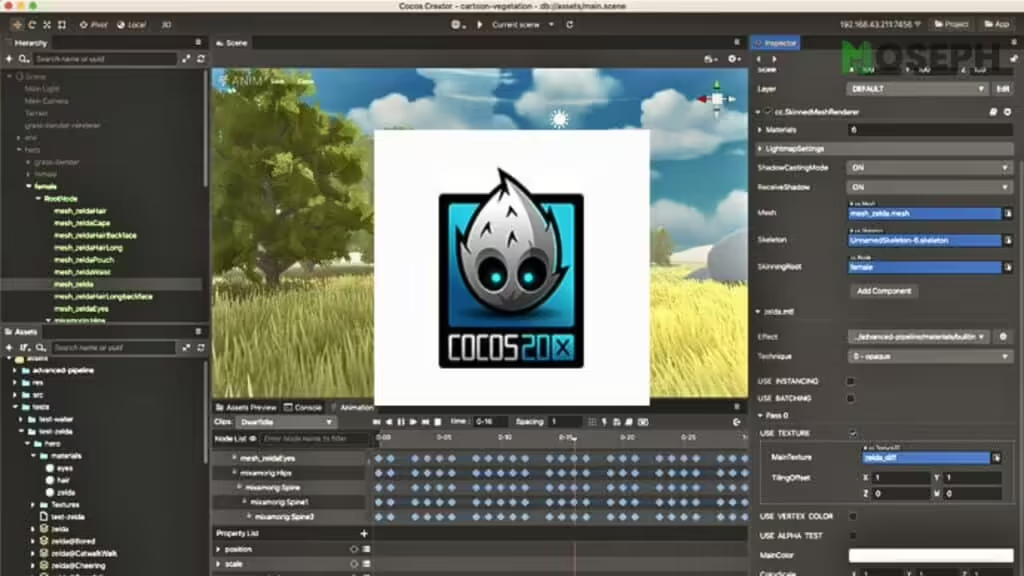
Over the years, Cocos2d-x has consistently evolved to meet the demands of modern game development, and 2024 is no exception.
Cocos2d-x Features:
- High-Performance 2D Graphics: Cocos2d-x is optimized for 2D graphics, offering robust support for features like skeletal animation, sprite sheets, and particle effects. The engine’s efficiency ensures smooth performance even on low-end devices, which is crucial for mobile gaming.
- Cross-Platform Development: Developers can publish games from a single code base to mobile, desktop, web, and console platforms. This flexibility is a major draw for developers looking to maximize their reach across different devices.
- Lightweight & Fast: The engine’s small footprint and fast execution make it a top choice for developers who need to create games that perform well on various devices, including those with limited hardware resources.
- Easy to Learn: Cocos2d-x offers simple and easy-to-learn APIs, making it accessible for developers at all skill levels. The extensive documentation and community support further enhance the learning experience.
- Strong Community Support: Being open-source, Cocos2d-x benefits from a large, active community that contributes to its development and provides extensive resources, including tutorials, forums, and pre-made assets.
Top AAA Games Developed with Cocos2d-x
Cocos2d-x has been used in the development of several popular and high-performing games, especially in the mobile market:
| Game Title | Developer | Year Released | Cocos2d-x Usage |
|---|---|---|---|
| Clash of Kings | Elex Tech | 2014 | Real-time strategy game leveraging Cocos2d-x’s cross-platform support |
| Badland | Frogmind | 2013 | Side-scrolling action game using Cocos2d-x’s 2D graphics engine |
| Hill Climb Racing | Fingersoft | 2012 | Physics-based racing game built with Cocos2d-x’s lightweight framework |
| Dragon City | Social Point | 2012 | Social simulation game utilizing Cocos2d-x for mobile platforms |
| Geometry Dash | RobTop Games | 2013 | Rhythm-based platformer developed using Cocos2d-x’s efficient engine |
Pros:
- Efficiency: Cocos2d-x is highly efficient, making it a great choice for mobile games where performance is essential.
- Cross-Platform Flexibility: The engine’s ability to run on various platforms from a single code base allows developers to maximize their game’s reach.
- Rich 2D Support: Originally a 2D engine, Cocos2d-x excels in creating high-performance 2D games with rich graphics.
Cons:
- Limited 3D Capabilities: Although it supports 3D, Cocos2d-x is primarily optimized for 2D game development, which might be limiting for developers focused on 3D games.
- Steeper Learning Curve: While the engine is powerful, it can be more challenging for beginners compared to other engines that offer more visual development tools.
Cocos2d-x continues to be a top choice for developers in 2024, particularly for those focused on creating high-quality, performance-oriented 2D games across multiple platforms. Its combination of efficiency, flexibility, and community support ensures that it remains a relevant and powerful tool in the game development landscape.
6. CryEngine
CryEngine has long been recognized for its ability to deliver stunning visual fidelity, and in 2024, it continues to be a top contender among game development frameworks. Originally developed by Crytek, this engine has powered some of the most visually impressive games in the industry, particularly in the first-person shooter (FPS) genre.

The updates in 2024 further solidify its position as a premier choice for developers aiming to create visually breathtaking and technically sophisticated games.
CryEngine Features:
- Advanced Real-Time Rendering: CryEngine is renowned for its real-time rendering capabilities, making it a go-to engine for developers focusing on high-quality visuals. The engine supports advanced features like real-time ray tracing, which enhances the realism of reflections, shadows, and lighting in games.
- Powerful Physics Engine: CryEngine includes a robust physics engine that allows for realistic simulations, including destructible environments and complex object interactions. This makes it ideal for games where physical realism is critical.
- Cross-Platform Development: With CryEngine, developers can create games for multiple platforms, including PC, consoles, and even VR. The engine’s flexibility ensures that games can reach a broad audience without compromising on quality.
- Visual Scripting System: One of the significant updates in 2024 is the introduction of a more refined visual scripting system, allowing developers to create complex game logic without deep programming knowledge, streamlining the development process.
- Optimized for High-End Hardware: CryEngine is optimized to take full advantage of the latest hardware advancements, ensuring that games run smoothly on cutting-edge systems.
Top AAA Games Developed with CryEngine
CryEngine has been the backbone of several blockbuster titles, particularly those known for their high visual standards and engaging gameplay:
| Game Title | Developer | Year Released | CryEngine Usage |
|---|---|---|---|
| Crysis Series | Crytek | 2007 – Present | Flagship series demonstrating CryEngine’s graphical capabilities |
| Hunt: Showdown | Crytek | 2018 | Multiplayer shooter with advanced environmental and lighting effects |
| Kingdom Come: Deliverance | Warhorse Studios | 2018 | Open-world RPG leveraging CryEngine’s realistic medieval environments |
| Ryse: Son of Rome | Crytek | 2013 | Action game known for its detailed character models and environments |
| Sniper: Ghost Warrior Contracts 2 | CI Games | 2021 | Sniper simulation game using CryEngine’s precision rendering |
Pros:
- Exceptional Visual Quality: CryEngine is unmatched when it comes to producing games with high visual fidelity, making it the preferred choice for developers who prioritize graphics.
- Robust Physics and Environmental Effects: The engine’s strong physics capabilities allow for immersive environments, with realistic destruction and interaction possibilities.
- Versatile Across Platforms: CryEngine’s ability to support PC, consoles, and VR ensures that developers can target multiple platforms with a single development pipeline.
Cons:
- Steeper Learning Curve: While powerful, CryEngine can be challenging to master, particularly for smaller teams or less experienced developers.
- High System Requirements: Games developed with CryEngine often require high-end hardware to run optimally, which could limit the engine’s use in developing for lower-end devices.
CryEngine remains a top choice for developers focused on creating high-end, visually stunning games. The advancements in 2024, particularly in real-time rendering and visual scripting, ensure that CryEngine continues to lead in the realm of game development frameworks.
7. RAGE (Rockstar Advanced Game Engine)
The Rockstar Advanced Game Engine (RAGE) has been the cornerstone of Rockstar Games’ development toolkit, enabling the creation of some of the most immersive and technically sophisticated open-world games in the industry.
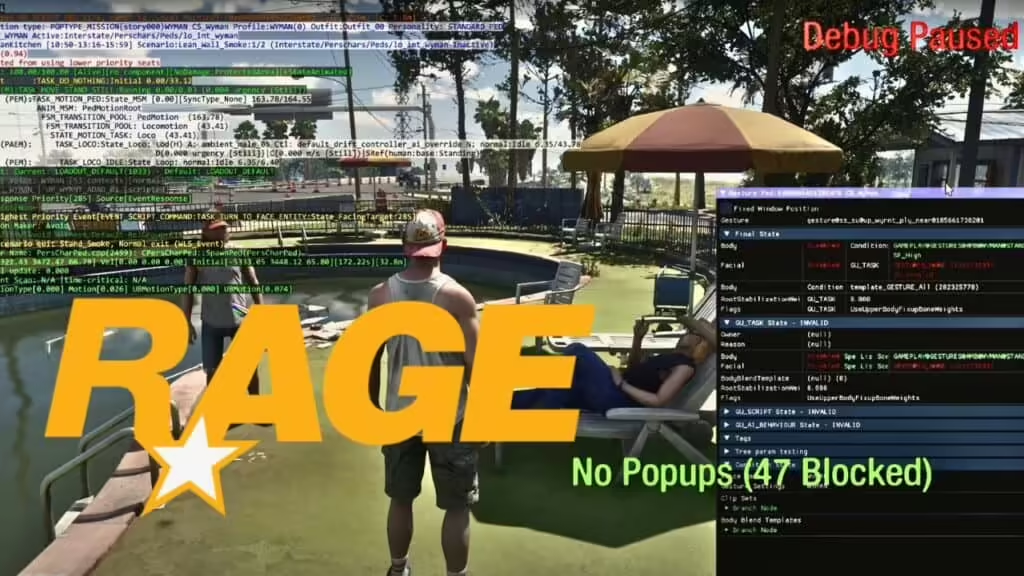
In 2024, the latest iteration, RAGE 9, has pushed the boundaries of what is possible in gaming, particularly with the upcoming Grand Theft Auto VI. This engine is built to deliver exceptional realism and performance, particularly in massive, dynamic open-world environments.
RAGE Engine Features:
- 16K Texture Support: RAGE 9 introduces support for 16K textures, setting a new benchmark in visual detail and fidelity. This allows for incredibly detailed environments, particularly in vast open-world games.
- Advanced NPC Behaviors: The engine enhances the realism of NPC interactions, with thousands of NPCs exhibiting complex, individual behaviors that respond dynamically to the player’s actions.
- Real-Time Water Simulation: RAGE 9 offers real-time water simulation, significantly enhancing the realism of water bodies, weather effects, and environmental interactions.
- Enhanced Physics and Vehicle Dynamics: The engine features advanced vehicle deformations and physics, offering more realistic driving experiences and interactions with the environment.
- Day-Night Cycle and Dynamic Weather: RAGE 9 includes a fully implemented day-night cycle and dynamic weather systems, further enhancing the immersive quality of the games built on it.
Top AAA Games Developed with RAGE
RAGE has powered some of the most iconic games in recent history, known for their groundbreaking open-world design and realism:
| Game Title | Developer | Year Released | RAGE Engine Usage |
|---|---|---|---|
| Grand Theft Auto V | Rockstar North | 2013 | Open-world game featuring advanced physics and dynamic weather systems |
| Red Dead Redemption 2 | Rockstar Studios | 2018 | Open-world western known for its realistic environments and NPC interactions |
| Max Payne 3 | Rockstar Studios | 2012 | Third-person shooter utilizing RAGE’s physics and cinematic effects |
| Midnight Club: Los Angeles | Rockstar San Diego | 2008 | Racing game showcasing RAGE’s real-time rendering and vehicle dynamics |
| Grand Theft Auto VI | Rockstar Studios | 2025 (Upcoming) | Next-gen open-world game pushing RAGE 9’s capabilities in realism and interactivity |
Pros:
- Unmatched Realism: RAGE 9 sets a new standard in gaming realism, particularly in open-world environments, thanks to its advanced NPC behaviors, realistic physics, and 16K texture support.
- Cutting-Edge Visuals: The engine is designed to take full advantage of modern hardware, delivering breathtaking visuals that push the boundaries of what’s possible in gaming.
- Dynamic Open-World Capabilities: RAGE is particularly strong in creating large, interactive open-world environments where players can experience dynamic weather, day-night cycles, and responsive NPCs.
Cons:
- Proprietary Engine: As a proprietary engine, RAGE is only available to Rockstar Games, limiting its accessibility to other developers.
- High System Requirements: The advanced features of RAGE 9 demand high-end hardware, making it challenging to optimize for lower-end devices.
RAGE continues to be a pivotal force in game development, particularly for Rockstar’s blockbuster titles. With its 2024 updates, RAGE 9 is set to further elevate the standards of realism and immersion in the gaming industry.
8. GameMaker Studio 2
GameMaker Studio 2 remains a highly accessible and powerful game development framework in 2024, especially for developers focusing on 2D games. This engine has long been favored by indie developers and small studios due to its user-friendly interface and extensive features that cater to both beginners and more experienced game creators.
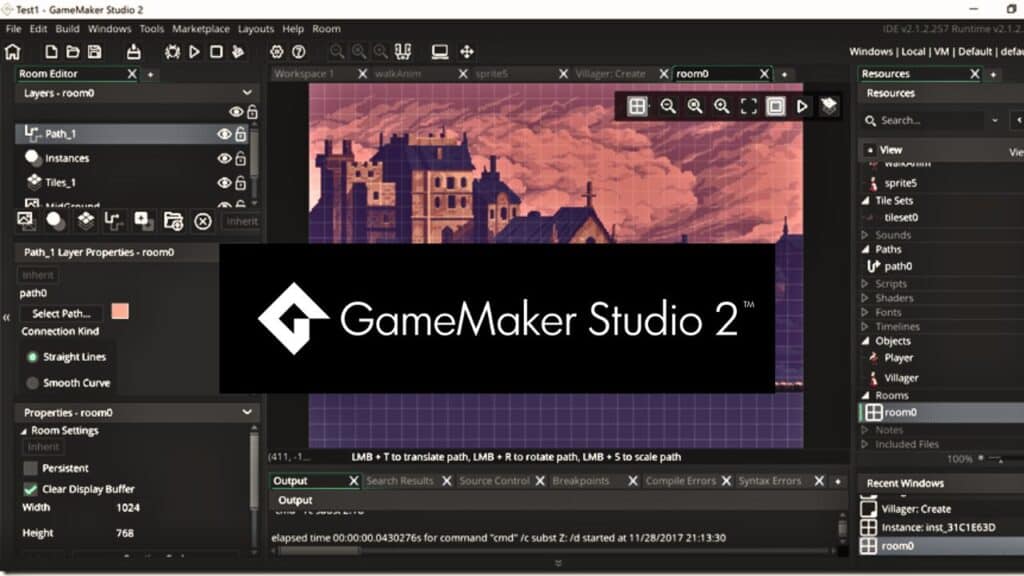
Over the years, GameMaker has continued to evolve, introducing several new features and enhancements to meet the growing demands of game development.
GameMaker Studio 2 Features:
- New Code Editor: The 2024 update introduced a new Code Editor that significantly improves the workflow for developers. It offers full-screen editing with advanced features like syntax highlighting, code completion, and error reporting. The editor supports multiple languages and provides an organized view of all code events, making it easier to manage complex projects.
- Prefabs and Plugins: GameMaker Studio 2 has added support for Prefabs, allowing developers to reuse assets across multiple projects. This feature simplifies the development process by enabling updates to be propagated across all instances of an asset. Additionally, the new plugin system lets developers create custom tools within the GameMaker IDE, further enhancing the engine’s flexibility.
- Physics Raycasting: The engine now includes advanced physics features like raycasting, which allows for more complex collision detection and interaction within games. This is particularly useful for games requiring precise physics calculations.
- Depth and Stencil Buffer Access: The latest updates also provide greater control over graphics with access to depth and stencil buffers, enabling advanced rendering techniques such as shadow mapping and volumetric effects, which enhance the visual quality of games.
Top AAA Games Developed with GameMaker Studio 2
While GameMaker Studio 2 is primarily known for indie games, it has also been used in the development of several highly successful titles:
| Game Title | Developer | Year Released | GameMaker Studio 2 Usage |
|---|---|---|---|
| Undertale | Toby Fox | 2015 | RPG with innovative mechanics and storytelling |
| Hyper Light Drifter | Heart Machine | 2016 | Action RPG using GameMaker’s pixel art capabilities |
| Katana ZERO | Askiisoft | 2019 | Side-scrolling action game with stylish combat |
| Hotline Miami | Dennaton Games | 2012 | Top-down shooter with a distinct retro aesthetic |
| Nuclear Throne | Vlambeer | 2015 | Roguelike shooter featuring fast-paced gameplay |
Pros:
- Ease of Use: GameMaker Studio 2 is designed to be user-friendly, making it accessible to developers of all skill levels, particularly those new to game development.
- Rich Feature Set: The engine offers a comprehensive set of tools, from basic 2D development to more advanced features like physics and custom scripting.
- Strong Community Support: GameMaker has a large and active community, providing a wealth of resources, tutorials, and pre-made assets that can help developers get started quickly.
Cons:
- Limited 3D Capabilities: GameMaker Studio 2 is primarily a 2D engine, and while it has some 3D functionality, it is not as robust as engines like Unity or Unreal.
- Performance Limitations: For very large or complex games, GameMaker might struggle with performance compared to more specialized engines.
GameMaker Studio 2 continues to be an excellent choice for 2D game development in 2024. Its ease of use, combined with a powerful set of tools and ongoing updates, makes it a reliable engine for both indie developers and small studios aiming to create high-quality games.
9. Phaser
Phaser has been a dominant force in the realm of 2D game development, particularly for web-based games, and its influence continues to grow in 2024. Known for its lightweight architecture and robust features, Phaser remains a go-to framework for developers looking to create fast, fun, and highly interactive 2D games.
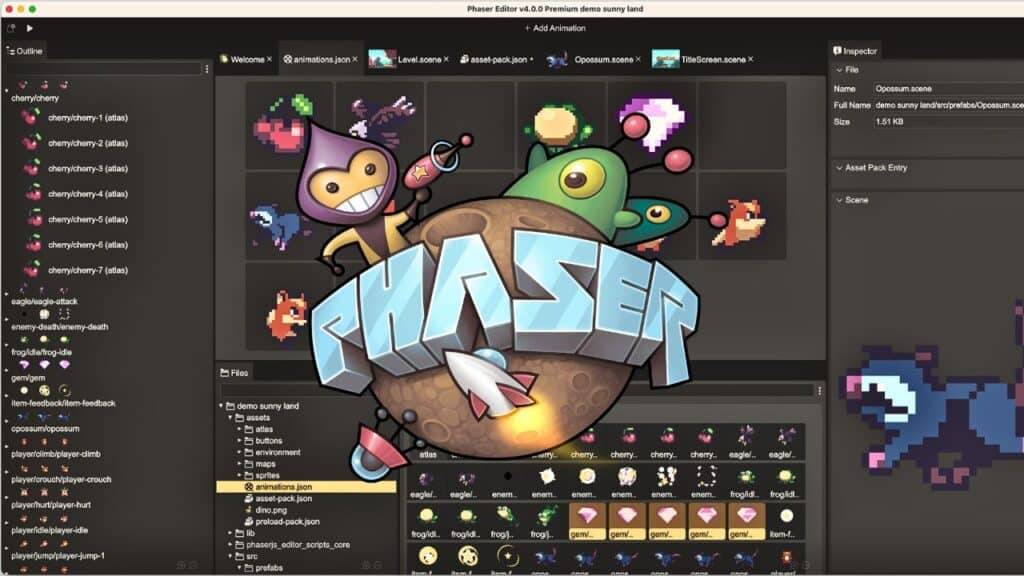
The latest update, Phaser 3.80, also known as “Nino,” brings several new enhancements that further cement its place as a top-tier game development framework.
Phaser Features:
- WebGL Context Loss Handling: The 2024 update introduced a robust solution to keep games running smoothly, even when facing WebGL context losses. This feature ensures that gameplay remains uninterrupted, which is crucial for delivering a seamless user experience on the web.
- Compressed Texture Improvements: Phaser now supports advanced texture formats like BPTC and RGTC, along with sRGB color spaces. These improvements enhance the visual quality of games while optimizing performance, especially important for mobile platforms.
- Base64 Loader Integration: This feature allows developers to load base64 encoded assets, making it easier to embed resources directly into the game’s code. This is particularly useful for environments like Playable Ads, where all assets need to be self-contained.
- Enhanced Tilemap Features: The update includes better control over tile-based game elements, improved tile collision detection, and more flexible rendering options, making Phaser ideal for creating complex 2D environments.
- Scale Manager Snap Mode: For pixel-art games and those requiring precise scaling, the new Scale Manager Snap Mode allows developers to set specific snapping values for game dimensions, ensuring consistent and accurate display across different devices.
Top AAA Games Developed with Phaser
While Phaser is typically associated with smaller, indie games, it has also been used in several notable projects that showcase its capabilities:
| Game Title | Developer | Year Released | Phaser Usage |
|---|---|---|---|
| Idle Miner Tycoon | Kolibri Games | 2016 | Idle simulation game using Phaser’s efficient 2D rendering |
| Slayaway Camp | Blue Wizard Digital | 2016 | Isometric puzzle game leveraging Phaser’s animation system |
| Geometry Dash World | RobTop Games | 2016 | Rhythm-based platformer utilizing Phaser’s physics engine |
| PuckIt! | GameDev.js Community | 2024 | Arcade game featuring Phaser’s WebGL enhancements |
| Summoner: The Bescarfed | Independent Developer | 2024 | Adventure game showcasing Phaser’s new tilemap features |
Pros:
- Ease of Use: Phaser is known for its straightforward API, making it accessible to developers of all skill levels, particularly those focused on web-based game development.
- Lightweight and Fast: Phaser’s architecture ensures that games load quickly and perform well, even on devices with limited resources.
- Rich Animation and Physics Tools: Phaser includes advanced tools for creating complex animations and realistic physics, making it a powerful option for 2D game developers.
Cons:
- Primarily 2D: Phaser is focused on 2D game development, which might limit its utility for developers looking to create 3D games.
- Web-Only: Phaser is designed specifically for web-based games, which may not be suitable for developers targeting native mobile or console platforms.
Phaser continues to be an excellent choice for web game developers in 2024. Its ongoing updates and strong community support ensure that it remains a relevant and powerful tool in the rapidly evolving landscape of 2D game development.
10. Solar2D
Solar2D, formerly known as Corona SDK, is a well-established, open-source game development framework that has maintained its relevance in 2024, particularly for mobile and 2D game development. It is powered by the Lua scripting language, known for its simplicity and efficiency, making it an ideal choice for developers who need to rapidly prototype and develop games.
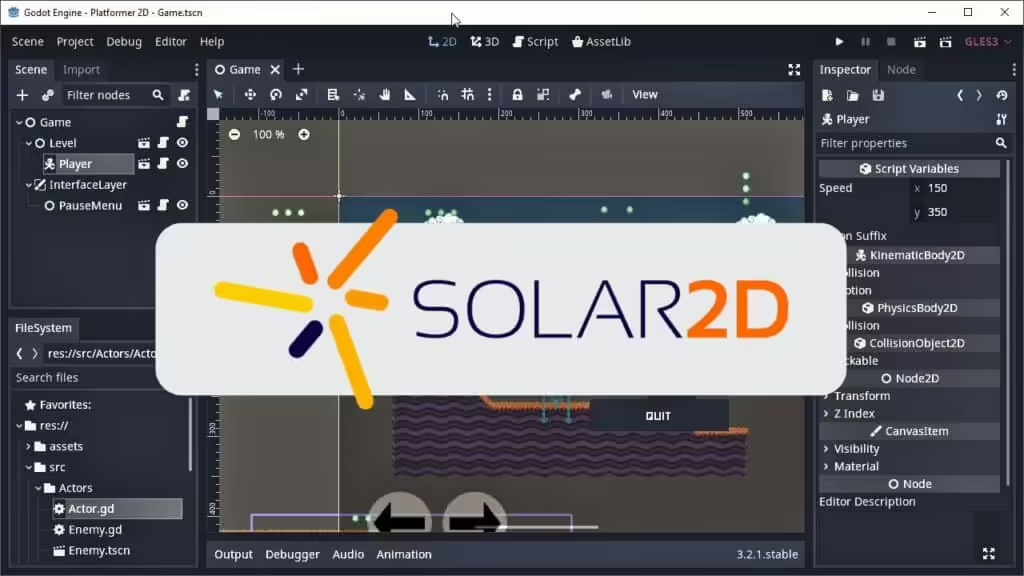
Solar2D’s ability to handle cross-platform deployment with ease further enhances its appeal, allowing developers to create games that can run on iOS, Android, Windows, macOS, and even connected TV platforms.
Solar2D Features:
- Rapid Iteration with Live Builds: Solar2D allows developers to see changes in real-time as they code, thanks to its live build feature. This capability speeds up the development process by eliminating the need to compile code repeatedly, which is particularly useful during the testing phase.
- Cross-Platform Development: With Solar2D, you can develop games that are compatible across multiple platforms, including mobile devices, desktop systems, and even smart TVs, from a single codebase.
- Extensive Plugin Support: Solar2D offers a wide range of plugins that extend its core functionality, covering areas like in-app advertising, analytics, and media handling. Developers can also integrate any native library if additional custom functionality is required.
- Optimized for 2D: While primarily a 2D engine, Solar2D is optimized to handle complex animations, physics simulations, and multimedia features efficiently, making it a strong contender for developers focused on 2D games.
Top AAA Games Developed with Solar2D
Solar2D has been utilized in several popular games, particularly in the mobile gaming space:
| Game Title | Developer | Year Released | Solar2D Usage |
|---|---|---|---|
| Angry Birds: Space | Rovio Entertainment | 2012 | Physics-based puzzle game using Solar2D’s efficient physics engine |
| Fun Run | Dirtybit | 2012 | Multiplayer running game leveraging Solar2D’s fast 2D rendering |
| Designer City | Sphere Game Studios | 2015 | City-building simulation game using Solar2D’s cross-platform support |
| Bubble Shooter | Ilyon Dynamics | 2013 | Classic arcade game built with Solar2D’s simple yet powerful 2D tools |
| Word Crossy | Betta Games | 2017 | Puzzle word game showcasing Solar2D’s rich text and multimedia support |
Pros:
- Rapid Development: Solar2D’s live build feature accelerates the development process, allowing developers to see immediate results and make quick adjustments.
- Cross-Platform Efficiency: The ability to deploy games across multiple platforms from a single codebase makes Solar2D highly efficient and cost-effective.
- Strong 2D Focus: Solar2D is particularly well-suited for 2D game development, with robust support for animations, physics, and multimedia integration.
Cons:
- Limited 3D Capabilities: Solar2D is primarily designed for 2D game development, which might be limiting for developers interested in 3D games.
- Niche Community: While Solar2D has an active community, it is smaller compared to some of the larger engines, which might limit the availability of third-party resources and plugins.
Solar2D continues to be a strong choice for developers focusing on 2D games, particularly in the mobile gaming space. Its combination of rapid development capabilities, cross-platform support, and a strong focus on 2D gaming ensures that it remains relevant in the evolving landscape of game development.
11. GDevelop
GDevelop has consistently been one of the most accessible game development frameworks, especially for those without programming experience. As a no-code, open-source engine, it has empowered many budding game developers to bring their ideas to life. In 2024, GDevelop continues to expand its capabilities, particularly with the release of version 5.4, which introduces significant new features that cater to both newcomers and experienced developers alike.
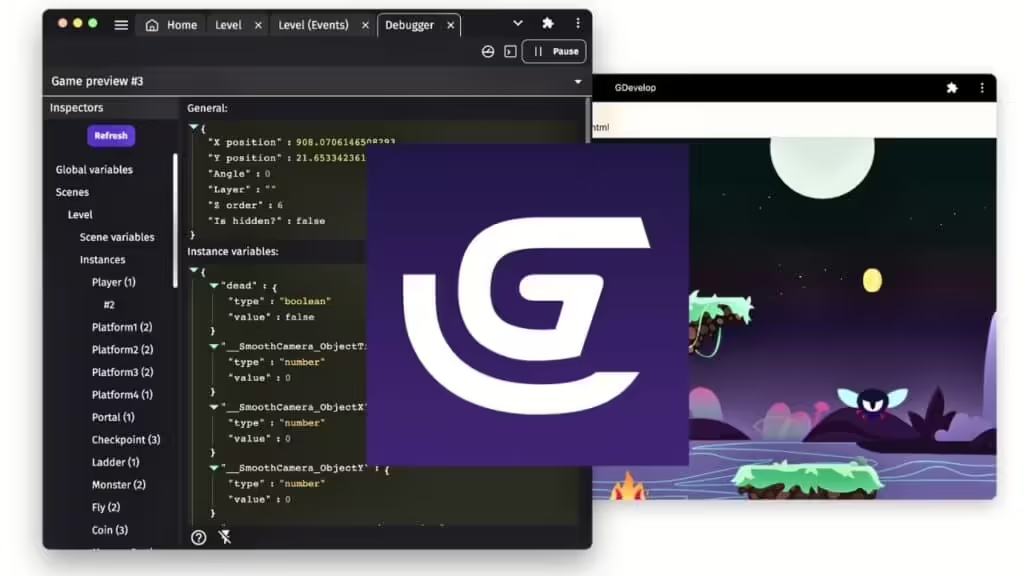
GDevelop Engine Features:
- Real-Time Multiplayer Support: The latest update has made multiplayer game development much easier. GDevelop now supports real-time multiplayer games with out-of-the-box solutions, including premade lobbies and automated synchronization of players and game states, which allows for seamless multiplayer experiences.
- Simplified Variables System: GDevelop 5.4 introduces a more intuitive way of handling variables, simplifying the development process. This update includes global, scene, and local variables that help developers keep their code clean and manageable.
- Diagnostic Reports: The new diagnostic tool identifies missing variables or behaviors in your event sheet, helping prevent bugs before they become an issue.
- Enhanced Export Options: GDevelop now offers one-click exports to multiple platforms, including direct uploads to app stores, which significantly reduces the time and effort required to publish games.
Notable Games Developed with GDevelop
GDevelop has been used to create a variety of engaging games, some of which have gained considerable attention:
| Game Title | Developer | Year Released | GDevelop Usage |
|---|---|---|---|
| Hyperspace Dogfights | Franz Hofmeier | 2018 | Roguelike aerial combat game utilizing GDevelop’s event-based system |
| Lil BUB’s HELLO EARTH | Bub’s Team | 2017 | Side-scrolling platformer with custom behaviors built in GDevelop |
| Vai Juliette! | Independent Developer | 2022 | Adventure game featuring GDevelop’s pathfinding and physics engines |
| Squaremoji | Independent Developer | 2020 | Puzzle game leveraging GDevelop’s visual scripting capabilities |
| Swamp | Independent Developer | 2019 | Survival game with complex AI behaviors created using GDevelop’s visual editor |
Pros:
- No Coding Required: GDevelop is perfect for beginners, offering a no-code environment where games can be created using visual editors and pre-built behaviors.
- Open Source and Free: GDevelop is completely free and open-source, making it accessible to everyone. It also has a supportive community that continuously contributes to its improvement.
- Cross-Platform Development: Games developed with GDevelop can be easily exported to multiple platforms, including HTML5, Android, and iOS, without requiring additional coding.
Cons:
- Limited 3D Capabilities: GDevelop is primarily focused on 2D game development, and while it has some 3D capabilities, they are not as robust as other engines like Unity or Unreal.
- Performance Limitations: While GDevelop is great for smaller projects, it might struggle with performance issues when handling more complex games with extensive assets.
GDevelop remains an excellent choice for developers who are just starting out or those who prefer a no-code approach to game development. Its continuous updates and the introduction of new features in 2024 ensure that it remains a relevant and powerful tool in the game development landscape.
12. Torque3D
Torque3D continues to be a dependable choice in 2024, particularly for indie developers and smaller studios looking for a powerful 3D engine without the burden of licensing fees. Known for its flexibility and strong feature set, Torque3D is well-suited for creating detailed 3D environments and simulations, making it a valuable tool for those looking to develop immersive games.

Torque3D provides advanced rendering options, user-friendly editing tools, and robust networking capabilities, making it easier for developers to build and manage their projects. Its ability to deploy across multiple platforms further enhances its utility, allowing games to reach a wider audience.
Top Games Developed with Torque3D
Torque3D has been used in various successful projects, particularly within the indie game development community, demonstrating its capabilities in producing visually appealing and interactive games.
| Game Title | Developer | Year Released | Torque3D Usage |
|---|---|---|---|
| Life Is Feudal: MMO | Bitbox Ltd. | 2017 | Open-world survival game with complex environments and interactions |
| The Repopulation | Above and Beyond Technologies | 2014 | Sci-fi MMORPG utilizing Torque3D’s flexible rendering engine |
| BeamNG.drive | BeamNG | 2015 | Realistic vehicle simulation game leveraging Torque3D’s physics engine |
| Deadly Matter | Studio Dim Sum | 2024 (Upcoming) | Horror game with advanced real-time rendering and environmental effects |
Pros:
- Free and Open-Source: Torque3D offers a full suite of tools at no cost, making it accessible for developers working with limited budgets.
- Customizable: The open-source nature of Torque3D allows developers to modify the engine according to their project needs.
- Strong Multiplayer Capabilities: Originally designed for online shooters, Torque3D is well-suited for multiplayer games, providing robust networking features.
Cons:
- Learning Curve: Torque3D can be challenging for newcomers, particularly those without prior experience in 3D game development.
- Smaller Community: Compared to more popular engines, Torque3D has a smaller user base, which may limit the availability of resources and community support.
Torque3D remains a solid choice for developers looking to create visually impressive 3D games without the costs associated with commercial engines. Its adaptable and powerful toolset makes it an appealing option for indie studios and smaller projects.
13. Stencyl
Stencyl offers a unique approach to game development, particularly for those who prefer creating 2D games without diving deep into programming. It has gained a strong following among indie developers and small studios due to its accessible design and effective tools.
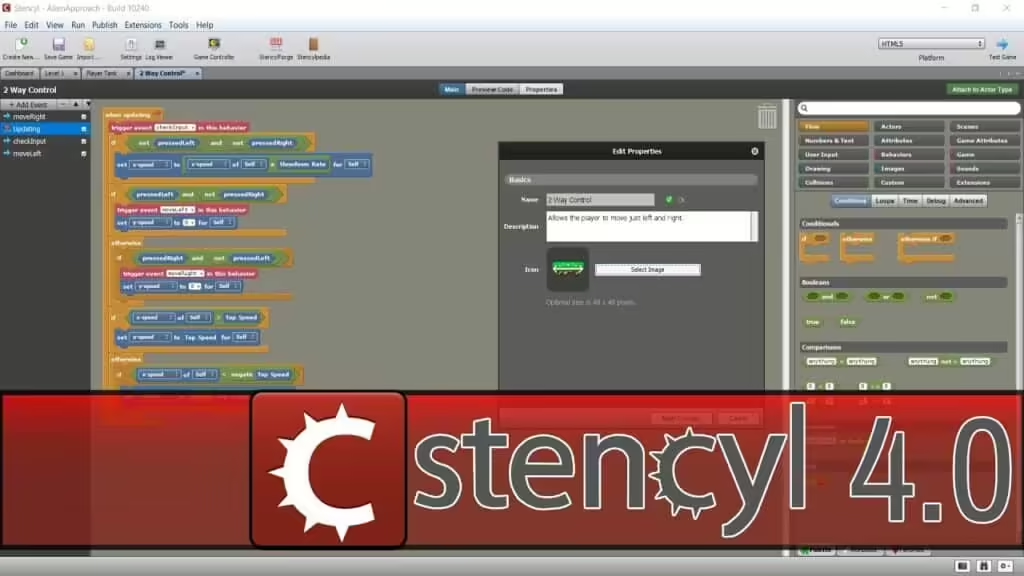
In 2024, Stencyl continues to stand out as a go-to option for those looking to develop games quickly and efficiently.
Stencyl Features:
- Drag-and-Drop Interface: The engine’s drag-and-drop system allows developers to create complex game mechanics visually, making it an ideal choice for those who may not be familiar with coding.
- Cross-Platform Publishing: Stencyl makes it easy to publish games on multiple platforms, including iOS, Android, Windows, Mac, Linux, and HTML5, ensuring that games reach a wide audience.
- Scene Designer: This feature simplifies the process of creating game environments, allowing developers to design and organize game levels with ease.
- Actor Editor: Stencyl provides a comprehensive toolset for designing characters and objects, enabling developers to customize behaviors, appearances, and interactions without the need for extensive coding.
Top Games Developed with Stencyl:
Stencyl has been used to create several popular indie games, especially in the mobile and web markets:
| Game Title | Developer | Year Released | Stencyl Usage |
|---|---|---|---|
| Super Dangerous Dungeons | Jussi Simpanen | 2015 | 2D platformer using Stencyl’s physics and animation tools |
| Zuki’s Quest | Arnold Rauers | 2014 | Puzzle platformer with intuitive touch controls |
| Impossible Rush | Om Patel | 2014 | Minimalist arcade game leveraging Stencyl’s fast iteration features |
| Papers Please (Fan Game) | Stencyl Community | 2017 | Simulation game with interactive storytelling elements |
| Wrassling | ColtGames | 2015 | Wrestling-themed arcade game using Stencyl’s physics engine |
Pros:
- User-Friendly Design: Stencyl’s visual interface is perfect for beginners, allowing for game creation without the need to write code.
- Versatile Export Options: The ability to publish on various platforms from a single environment is a significant advantage.
- Strong Community Support: Developers can find plenty of resources, tutorials, and pre-made assets through Stencyl’s active community.
Cons:
- 2D Focused: Stencyl is designed primarily for 2D games, which may limit its appeal for developers interested in 3D projects.
- Performance Challenges: Larger or more complex games may experience performance issues, especially on mobile platforms.
Stencyl continues to be a valuable tool in the game development world, especially for those focused on creating 2D games. Its ease of use and strong community make it an attractive choice for both new and experienced developers.
14. HaxeFlixel
HaxeFlixel has been a preferred framework for 2D game developers, especially those who appreciate its open-source nature and strong support for pixel art and retro-style games. As of 2024, HaxeFlixel continues to be a solid choice, bolstered by the latest release, HaxeFlixel 5.4.0, which introduces several new features aimed at improving asset management, animation, and performance.
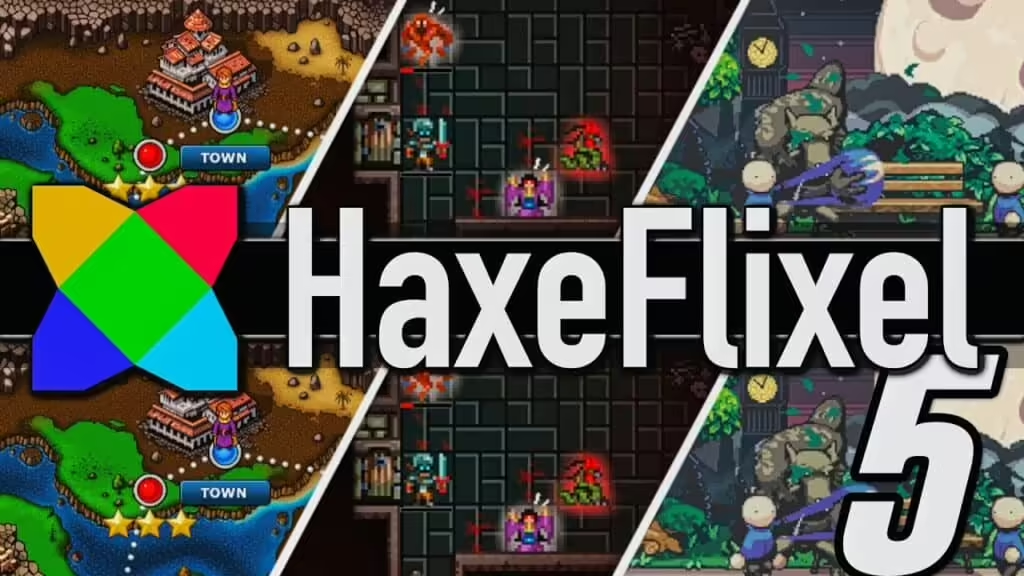
HaxeFlixel is widely recognized for its capability to handle complex 2D game development with ease, providing developers with a robust set of tools to bring their creative visions to life. The new features added in the latest update make it an even more attractive option for those working in the indie game space, particularly for titles that emphasize strong visuals and engaging gameplay.
Top Games Developed with HaxeFlixel:
Here are some of the top games developed using HaxeFlixel, demonstrating its capability in the gaming industry:
| Game Title | Developer | Year Released | HaxeFlixel Usage |
|---|---|---|---|
| Celeste | Matt Makes Games | 2018 | Critically acclaimed platformer with tight controls and pixel-perfect graphics |
| Streets of Rage 4 | Dotemu | 2020 | Modern beat ’em up with smooth animations and responsive gameplay |
| Papers, Please | Lucas Pope | 2013 | Indie puzzle simulation with immersive storytelling |
HaxeFlixel Features:
- Aseprite Integration: The 5.4.0 update introduces new utilities like FlxAsepriteUtil, allowing developers to define animation data directly from Aseprite files. This tool makes it easier to manage complex animations and has been a significant improvement for pixel art games.
- Multi-Atlas System: This feature allows for the combination of multiple atlases at runtime, enabling more extensive and detailed animations without overloading the system. It’s particularly beneficial for developers working on projects with heavy animation requirements.
- Enhanced Animation Tools: The introduction of time scaling for animations allows for smoother transitions and dynamic adjustments to animation speed, which is particularly useful for games that require varying tempos.
- Improved Visual Scripting: HaxeFlixel 5.4.0 has refined its visual scripting tools, making it easier for developers to create and modify game logic without deep programming knowledge, streamlining the development process.
Pros:
- Strong 2D Focus: HaxeFlixel is particularly well-suited for 2D game development, with robust tools for managing pixel art, animations, and sprite handling.
- Open Source: As an open-source framework, HaxeFlixel is free to use, making it accessible to a wide range of developers.
- Active Community: The HaxeFlixel community is active and supportive, providing extensive documentation, tutorials, and resources for both new and experienced developers.
Cons:
- Limited 3D Capabilities: While HaxeFlixel excels in 2D, it has limited support for 3D game development, which might not meet the needs of developers focusing on more complex 3D projects.
- Niche Focus: Its strong emphasis on pixel art and retro-style games may limit its appeal to developers looking for a more modern or mainstream aesthetic.
HaxeFlixel remains a top choice for 2D game developers in 2024, especially for those focused on retro or pixel-art games. The latest updates have enhanced its capabilities, making it an even more effective platform for creating engaging and visually distinct games.
Conclusion
Choosing the right game development framework is key to bringing your creative vision to life. Each framework discussed in this article offers unique strengths, tailored to different types of projects and development needs. As you consider your options, think about what will best support your goals and the kind of gaming experience you want to create.
I value your input, so feel free to share your thoughts in the comments section below. I’ll keep this article updated with new developments and features, ensuring you have the latest information to guide your decisions in this ever-evolving field.

